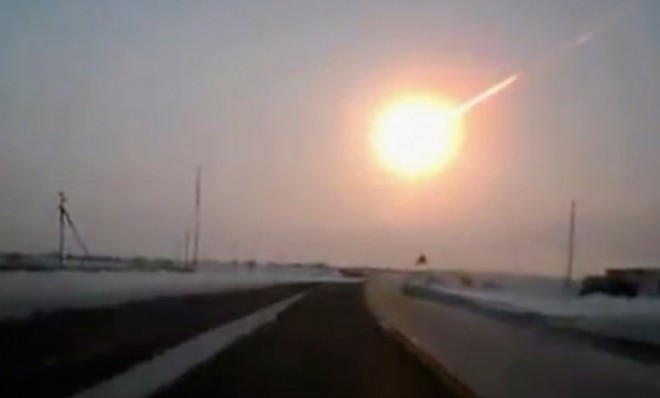Everything you need to know about meteor strikes
Incidents like the one over Russia happen roughly once every five years, and there's little we can do to predict them


A free daily email with the biggest news stories of the day – and the best features from TheWeek.com
You are now subscribed
Your newsletter sign-up was successful
On Friday, a meteor exploded 32,000 feet above the Chelyabinsk region of Russia, lighting up the sky and producing a shockwave that shook buildings and shattered windows. At least 1,000 people were injured in the blasts, the highest toll ever caused by an object from space. Video footage of the meteorites, while mesmerizing, is also terrifying. It "appeals to our most primitive fears," tweeted The Week's D.B. Grady. "It's an astonishing glimpse at the end of the world." Here's what you should know about Russia's meteor blast, and others like it:
First off: What exactly is a meteor?
Meteors are space rocks that find their way into Earth's atmosphere. They can be as small as a grain of sand or as big as a boulder. They usually burn up during their descent. The ones that survive are called meteorites, and they can hit the Earth at speeds of up to 18,600 mph.
The Week
Escape your echo chamber. Get the facts behind the news, plus analysis from multiple perspectives.

Sign up for The Week's Free Newsletters
From our morning news briefing to a weekly Good News Newsletter, get the best of The Week delivered directly to your inbox.
From our morning news briefing to a weekly Good News Newsletter, get the best of The Week delivered directly to your inbox.
How often do they hit Earth?
Small strikes occur once every few months, but often go unnoticed. "Two-thirds of the Earth is ocean, so we tend to miss them," says Robert Massey of Britain's Royal Astronomical Society. He estimates the object that exploded over Russia was roughly 30 feet across upon entry, and weighed eight to 10 tons. Meteorite strikes this big are rare, but still happen about once every five years. In 2008, for instance, a big meteor exploded over Sudan. No one was hurt.
Can we detect these meteors before they hit?
Not really. Meteors like this go mostly undetected by telescopes, which are busy scanning for massive asteroids. And even if we do manage to spot an incoming rock, "there's not a weapon forged by man that could do something about it," says Spencer Ackerman at Wired. But don't worry: "You're thousands of times more likely to die by car on [your] way to work" than by meteor strike, says Brian Weeden of the Secure Earth Foundation.
A free daily email with the biggest news stories of the day – and the best features from TheWeek.com
What's the worst-case scenario for a meteorite strike?
The largest meteorite strike in recorded history was in 1908, also over Russia. Know as the "Tunguska event," the blast from the impact was more powerful than the atomic bomb dropped on Hiroshima. It leveled millions of trees, but miraculously, no one was killed. If a similar impact happened over a metropolitan area, the city would be destroyed. "It's a global challenge and we need to find a solution together," says European Space Agency spokesman Bernhard von Weyhe.
Check out footage of Friday's strike over Russia:

Jessica Hullinger is a writer and former deputy editor of The Week Digital. Originally from the American Midwest, she completed a degree in journalism at Indiana University Bloomington before relocating to New York City, where she pursued a career in media. After joining The Week as an intern in 2010, she served as the title’s audience development manager, senior editor and deputy editor, as well as a regular guest on “The Week Unwrapped” podcast. Her writing has featured in other publications including Popular Science, Fast Company, Fortune, and Self magazine, and she loves covering science and climate-related issues.
-
 The Olympic timekeepers keeping the Games on track
The Olympic timekeepers keeping the Games on trackUnder the Radar Swiss watchmaking giant Omega has been at the finish line of every Olympic Games for nearly 100 years
-
 Will increasing tensions with Iran boil over into war?
Will increasing tensions with Iran boil over into war?Today’s Big Question President Donald Trump has recently been threatening the country
-
 Corruption: The spy sheikh and the president
Corruption: The spy sheikh and the presidentFeature Trump is at the center of another scandal
